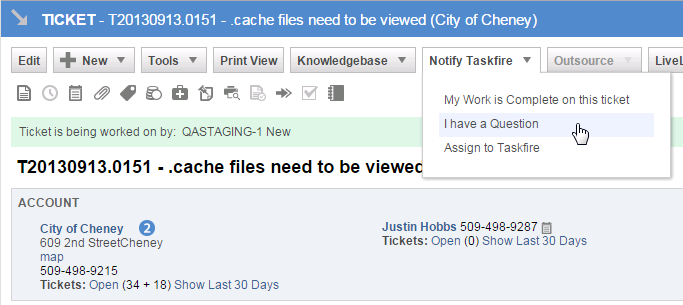Managing tickets created in Client Portal
PERMISSIONS All Autotask resources with access to Service Desk, or who were assigned the ticket
Your end clients can submit tickets to you through the Client Portal. This happens when they do not have Taskfire (and the ability to work on their own tickets), or if they decide they don't have the qualifications to resolve a Taskfire ticket internally.
Finding Client Portal and Taskfire tickets
Tickets that use a Request Type you created in Autotask will go to the queue you specified. If no queue is specified, or if the ticket uses a request type your client created, they will go to the Client Portal queue.
Request types are configured in a template set up by your Autotask Administrator. Refer to Managing service request types.
All tickets submitted through the Client Portal have a ticket source of Client Portal, so you can search for Client Portal tickets based on source.
Setting the ticket work type
Tickets coming in through the Client Portal may not have a Work Type automatically set. To do this, your Autotask Administrator can set up a workflow rule to automatically assign a default Work Type. Simply create a rule as follows:
- Event: Ticket is Created.
- Condition: Source = Client Portal
- Actions: Work Type = [the Work Type you want to assign]
Client Portal has customizable email-notification templates that can be configured to automatically notify recipients. For more information, refer to Notification templates.
Date discrepancies
When you have a Client Portal user located in a different time zone and that user creates a ticket in Autotask, the ticket number is taken from Autotask and based on your Autotask time zone. The ticket number includes the current date.
However, the "Created" date that appears on the ticket is taken from the Client Portal user's time zone. Depending on the time of day the ticket was created, the time zone differences may cause the date in the ticket number to differ from the "Created" date displayed on the ticket.
The "Completed" date for a Taskfire ticket displayed in Client Portal depends on to whom the ticket is currently assigned. The Taskfire complete date will be used if the ticket is assigned to the client. Your complete date will be used if the ticket is assigned to you.
Working on Client Portal tickets
Client Portal tickets are worked like any other ticket.
Your client users who have been enabled for the Client Portal can view their organization's tickets (created through the Client Portal or not!) and associated data in the Client Portal.
Access to data in the Portal is based on assigned security levels. Refer to Managing Client Portal and Taskfire security levels.
Date filter for recurring tickets
The only additional restriction is the optional date filter you can apply in the Client Portal Global Settings. Refer to Managing Client Portal organizations.
NOTE For recurring tickets, only those with a Due Date <= 30 days will appear in the Client Portal, regardless of security level.
Working on Taskfire tickets
If your client has Taskfire, you may share the work on the ticket.
In general, a Taskfire ticket is worked like any other ticket, but you have some additional options to communicate and collaborate with your clients. A Taskfire menu appears on the Ticket page with the following options:
-
My work is Complete on this ticket: Use this option to notify the Taskfire user that you have completed your part of the work on the ticket. This will add a note to the ticket and will change the Status on the Taskfire user's ticket (not your own). You will need to follow your normal procedures for completing or closing your Autotask ticket.
-
I have a Question: Use this option to add a note to the ticket with a question for the Taskfire User. When they view the ticket in the Client Portal, they will see the note in the Work History. In addition, the Taskfire assigned resource for the ticket is notified.
-
Assign to Taskfire: Use this option to assign the ticket to Taskfire. You can assign the Taskfire queue and resource, and you will be required to add an explanatory note.
NOTE When you assign a ticket to Taskfire, a new version of the ticket is created for Taskfire and your current ticket remains in your Autotask instance. These tickets share a ticket number and Taskfire-related ticket notes.
Deleting a shared ticket
You can delete your version of a shared Taskfire ticket. If you do so, the Taskfire version of the ticket is deleted also. The Taskfire assigned resource will be notified.



